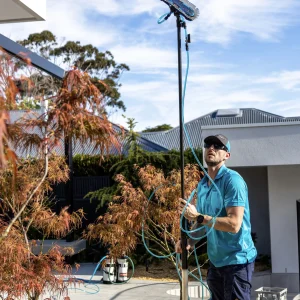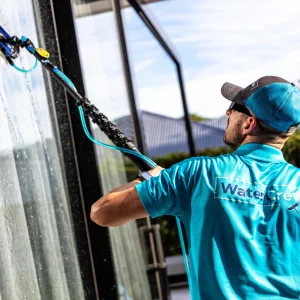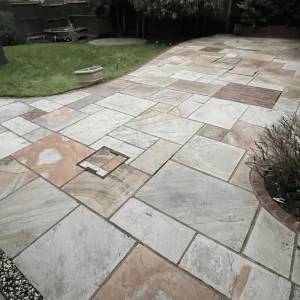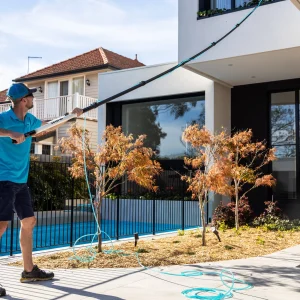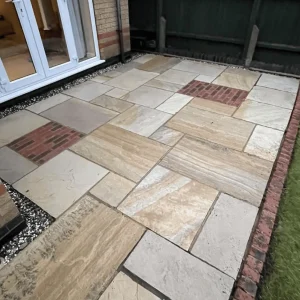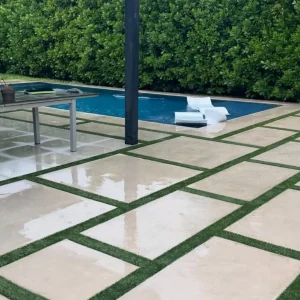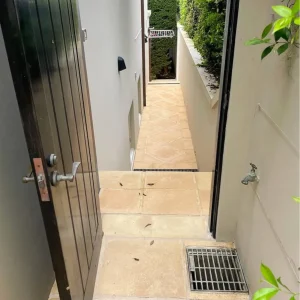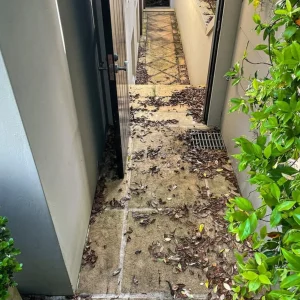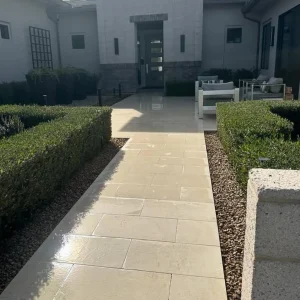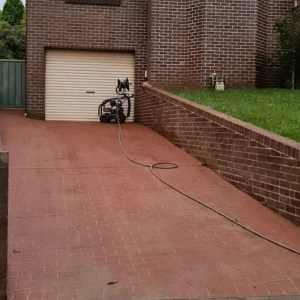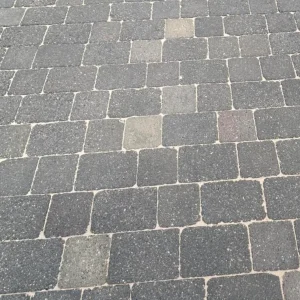Ever Tried Pressure Cleaning in 40-Degree Heat? Outdoor pressure cleaning sounds simple enough — until you’re standing on a concrete path in thongs, wrestling a high-pressure hose that kicks harder than your uncle’s Hilux. At Water Crew, we’ve tackled patios mid-cyclone season and pressure-washed roof grime in Tassie winters. Trust us: the weather matters, and so does how you clean.
Whether it’s driveway cleaning, house washing, or roof cleaning, we’ve done it all.
- Terrific job by Water Crew cleaning our courtyards, rooftops and windows.read moreread lessChris Grigsby2/02/2026Eren takes the time to do an excellent job. He is very thorough and we are always amazed just how clear the windows are after his clean. I like that he has the proper equipment to clean gutters without having to climb on the roof. I recommended him to other family members and will be using his services regularly.read moreread lessDavid Neiger1/15/2026
What Works and What Doesn’t
Pressure cleaning, or high-pressure cleaning, is all about using high-pressure water to shift built-up muck, grime, mould, moss and the lot from your outdoor surfaces. Sounds simple, right? Not quite.
Here’s what it does well:
- Cuts through stubborn stains on concrete and brick
- Strips built-up mould and algae from decks and pavers
- Clears out grime from paths, pool surrounds, outdoor furniture and more
But it doesn’t:
- Fix structural issues (pressure won’t mend your crumbling mortar)
- Work miracles on deep oil stains without chemical cleaners
- Suit every surface (more on that below)
A Tradie’s Quick Reference
Before we touch a pressure cleaner, we size up the job. Because trust us, not all surfaces can take a 3000 PSI beating.
Here’s a down-to-earth checklist of what we clean and how:
Concrete and flat surfaces
- Great for: Full-pressure cleaning
- Watch out for: Loose paint or sealants that may strip
Decking (timber or composite)
- Great for: Low-pressure soft wash with a fan nozzle
- Watch out for: Splintering timber, age over time, and raised grain from aggressive water blasting
Render and house walls (coloured or painted)
- Great for: Soft washing only
- Watch out for: Pigment stripping, water ingress, and etching on delicate surfaces
Outdoor surfaces like tiled or slate patios
- Great for: Low to medium pressure with a surface cleaner
- Watch out for: Lifting tiles, grout damage, and surface wear
Natural stone and decorative elements
- Great for: Low-pressure cleaning with appropriate pressure settings
- Watch out for: Harsh chemicals and too much pressure damaging the finish
Outdoor furniture
- Great for: Gentle rinse or soft brush with low operating pressure
- Watch out for: Loose paint or sealants that may strip
The Ookie Mistake? Going Full Blast
We’ve fixed more DIY outdoor pressure cleaning fails than we care to count. One bloke in Melbourne stripped the paint off his stencilled driveway. Another client etched zebra stripes into their deck trying to blast off bird poo. Happens all the time.
Here’s why it’s a problem:
- Too much pressure damages delicate surfaces
- Wrong nozzle changes pressure levels and creates uneven spray patterns
- Holding the wand too close causes permanent gouges
Always test a small patch. And if you’re not sure? Step away from the pressure wand.
Our Go-To Gear (and Why We Trust It)
Let’s talk gear. Over the years we’ve tested a wide range of pressure washers and attachments. From bargain store hoses to full-duty commercial units. Here’s what actually gets the job done:
- Petrol pressure washers: For jobs that need extra power, especially on commercial or large-scale outdoor surfaces
- Surface cleaners: For cleaning large, flat surfaces without streaks
- Soft wash systems: Gentle enough for house exterior walls, painted render and delicate materials
- Turbo nozzles: Good for stubborn stains — never use these on fragile or decorative surfaces
- Variety of accessories: Telescopic wands, gutter lances, fan and cone nozzles for controlled pressure settings
Pressure Settings
Not all pressure cleaners are created equal. Understanding operating pressure and pressure ratings is key. Here’s the lowdown:
- Light-duty (under 2000 PSI): Outdoor furniture, windows, house walls
- Medium-duty (2000–3000 PSI): Decks, fences, lightly stained concrete
- Heavy-duty (3000+ PSI): Driveways, commercial spaces, stained flat surfaces
The goal isn’t just maximum pressure — it’s the right pressure. High-pressure water at the wrong setting can strip protective coatings, gouge timber and force water into gaps.
Melbourne Weather
We’re based in Melbourne so we know the damage our four-seasons-in-a-day routine can do.
- Winter: Traps moisture on decks and shaded walkways, encourages mould
- Summer: High UV degrades sealants and fades house exteriors
- Autumn: Leaves break down and stain natural stone and porous outdoor surfaces
- Spring: Nesting birds and pollen add to the cleaning time come warmer months
Stay on top of seasonal cleaning and your surfaces will age slower.
Soft Wash vs High-Pressure Cleaning
We get asked this one a lot.
- Soft washing: Best for house walls, render and delicate finishes. Low pressure and eco-safe chemical cleaners to break down grime without damage.
- High-pressure cleaning: Great for outdoor surfaces that can take a hit — like concrete driveways, retaining walls and paved areas.
Each has its place. Most properties need a combo of both, especially older homes or those near the coast.
Don’t Overdo the Chemicals
Chemical cleaners help, but they’re not magic. And harsh chemicals can kill garden beds, etch natural stone and damage coatings.
If you’re DIYing:
- Use biodegradable options where possible
- Pre-wet plants and lawn to dilute overspray
- Never mix brands or types unless you want a backyard science experiment
- Rinse thoroughly with low-pressure water to avoid damage
Pressure Washing Safety Tips
That water jet might look harmless, but it can cut through skin or shatter outdoor furniture if you’re not careful. Here’s how we stay safe:
- Wear gloves, boots and eye protection
- Keep the wand moving and maintain a safe distance
- Watch out for power points and slippery surfaces
- Never point the wand at someone, even jokingly
When to Clean Outdoor Areas
General guide:
- Driveways: 1-2 times a year
- Decks & patios: Annually or after storms
- House exterior: Every 18-24 months depending on exposure
- Outdoor furniture: Spring and after prolonged wet weather
If you’re near saltwater or red dust zones, more frequent cleans may be needed to protect finishes.
Price Guide
Just like pressure levels, pricing varies with job size and surface type:
- Basic driveway: $150-$250
- Full exterior house clean: $400-$900
- Roof or high-access areas: $1000-$3000
- Commercial façades or strata jobs: $800 – $2000+
Ask upfront about travel charges, GST and if they supply water.
Leave It to the Pros
Some cleaning tasks just need a professional service. Whether it’s reaching a three-storey house exterior, cleaning a mildewy fence or safely restoring natural stone features — experience matters. At Window Cleaning Melbourne Crew we do more than just windows. Our team of experts can pressure clean for residential and commercial jobs, with custom pressure settings for every surface. From time efficiency to equipment that suits every surface we help extend the life of your property without damaging it.
Need a quick quote or advice on your outdoor pressure cleaning job? Contact Window Cleaning Melbourne Crew. We’ll point you in the right direction — even if that means telling you to leave the pressure washer in the shed.

Your satisfaction is our top priority. We tailor our services to meet your specific needs

We are committed to environmental responsibility. Our cleaning products are eco-friendly.

Pricing
We offer competitive pricing without compromising on the quality of our services.

Expertise
As a locally owned and operated company, we understand the unique needs of our community.
FAQ
What PSI pressure washer do I need for home use?
For most home jobs 2000-3000 PSI will do, for delicate surfaces like outdoor furniture or painted walls stick to the lower end with adjustable settings.
Can high-pressure cleaning damage concrete?
Yes, especially if the surface is already weakened or you use too much pressure in one spot. Always test a patch and use a surface cleaner for even results.
How long does it take to pressure clean a driveway?
A small driveway might take an hour, a larger one with set-in stains could take up to 3 hours. Cleaning time also depends on equipment and water flow.
Is soft washing better than pressure washing?
Not better — just different. Soft washing is for fragile or painted surfaces, high pressure is for tough outdoor surfaces like brick and concrete.
Can I use vinegar or DIY cleaners instead of chemical products?
You can, but they’re often less effective on things like oil or deep mould. If using natural solutions test them first and rinse well to avoid damage.

